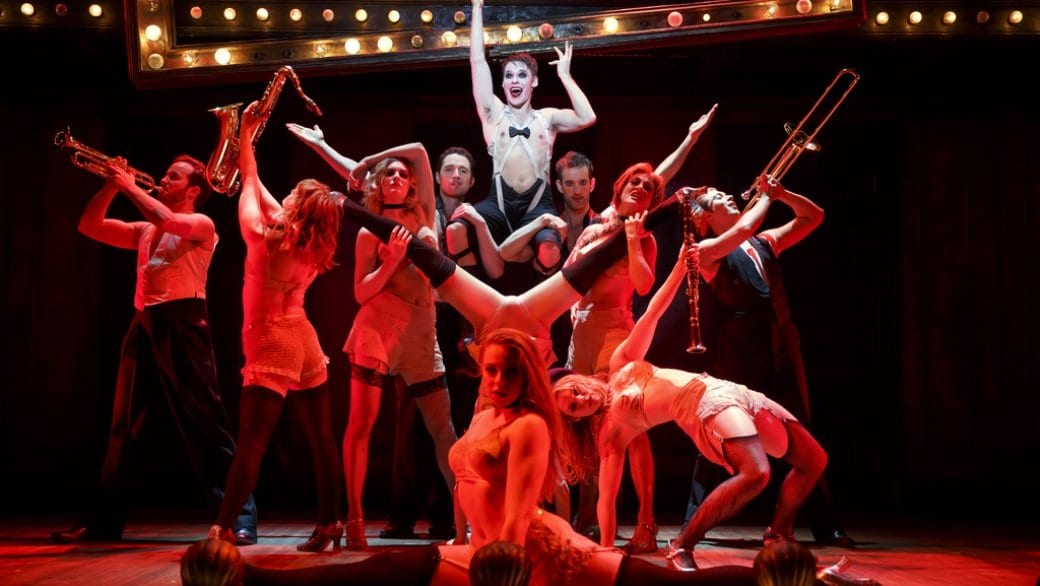“You’re too into politics,” shouts Sally Bowles.
She is arguing with her American novelist boyfriend, Cliff Bradshaw, who she met while performing cabaret at the seedy Kit Kat Klub.
“And if you read the newspaper, you’d know what’s going on!” he shouts back. Cliff has been renting a board room in Berlin to write his book, but is heading back to America as Berlin is on the verge of being taken over by Nazi Germany, a reality that few around him seem to be concerned about.
A spat between lovers, but much more than that. It becomes a matter of life and death. Sally and her friends at the Kit Kat Klub — dancers, sex workers, drunkards — are swept up in debauchery and sexual excess; the freedom to fuck anyone from any sexual orientation or gender is a sign that life in Berlin is getting better. To acknowledge that these freedoms could be taken away is unthinkable.
Cabaret is the Tony Award–winning play currently running at Toronto’s Princess of Wales Theatre until Feb 19, 2017, and produced by the Roundabout Theatre Company.
mirvishproductions/YouTube
Set in 1931 Berlin, as the Nazis are rising to power, it is based in the nightlife at the seedy Kit Kat Klub. Subplots are Cliff and Sally’s relationship, and the doomed romance between Fräulein Schneider, a German boarding house owner, and Herr Schultz, a Jewish fruit vendor.
What’s timeless about Cabaret is that many of its themes — the threat of politics and the loss of freedom — can be applied to many eras and events within our histories, from the bloody — the Holocaust, the Rwandan, Armenian and Bosnian genocides; the conflict in Syria — to less horrific events such as the 1981 Toronto bathhouse raids and 2017 America, where the freedoms, protections and rights of LGBT people that were put in place by President Barack Obama are slated to be undone by current President Donald Trump.
One of the most fundamental themes of Cabaret is the lure of sexual freedom. Here are five takeaways about sex, freedom and politics that still apply today.
1) Sexual freedom can be taken away at any moment
“The stag in the forest runs free/But gather together to greet the storm,” is from the song, “Tomorrow belongs to me,” foreshadowing an impending political darkness.
When Cliff Bradshaw gets to Berlin, he is taken by the raw sexuality inside the Kit Kat Klub. Approached by both men and women, he’s shocked and intrigued by the fluidity of gender and sexuality.
Throughout, we see how characters (especially the Emcee) perform different genders and engage in various sexualities, which flourish in the safe space of the Kit Kat Klub — until the final scene when the performers end up in a Nazi concentration camp, and the Emcee’s striped prison clothes sport a yellow badge (denoting Jews) and a pink triangle badge (denoting homosexuals).
The contrast is jarring, and a lesson that sexual freedom is not absolute, and can change with every election, war or political leader.

2) Politics can not only restrict sexual freedom; they can criminalize it
At the Kit Kat Klub, sex and fluidity is a means of expression — until the Nazis come to power. While nowhere near this extreme, politics can change with every election, and so can the attitudes of a country.
In the eight years of Obama’s presidency, many US states turned from Democratic blue to Republican red. Obama was the only president to establish so many codified protections for LGBT people, which in turn, gave many folks a sense that the US was moving towards adopting a more inclusive outlook on queer and trans people. However, within the first several days of the Trump administration (many of whom are anti-LGBT), Trump came close to reversing Obama’s executive order providing protections for LGBT people in the workplace, during a time that a record number of Americans identify as LGBT. While he decided not to repeal, there are reportedly more executive orders coming that will target queer people, and the bathroom bill continues to puts trans people at risk.
Canada remains a world leader in criminalizing people living with HIV, an issue that the Trudeau government pledged to work on. Liberals are also working to scrap the anal sex law that places the age of consent at 18, two years higher than the age of consent for vaginal sex, and criminalizes anal sex in public with more than two people. Canada has yet to issue pardons for men convicted of old homophobic laws including buggery and gross indecency.
3) Being a citizen of a country doesn’t make you less susceptible to having your rights taken away
“I know the Germans . . . I am German,” says Herr Schultz, a Jewish fruit vendor. He’s trying to assure Cliff that he’ll be safe in Germany, because, above all, he is German.
Citizenship is not a guarantee that your rights won’t be taken away. Various other factors — ethnicity, religion, race, gender, sexual orientation — clash with citizenship.
After Trump’s executive order banned people from seven predominantly-Muslim countries, even initially to permanent residents and green card holders of the US were not allowed back in the country if they had left. Citizens of the US from these countries were also detained at airports. This left thousands of people barred from their homes, jobs, family and school. After the initial confusion, it was announced that Canadians would not be turned away from the US, though recently, several Canadians were turned away, including a woman because she had prayers on her phone in Arabic.

4) Sexuality will always be a target for political, religious and heteronormative agendas
In Cabaret, Berlin grew into the city of sex — but it hadn’t always been that way.
Sexuality has, for centuries, been a heated debate among various social, political and religious groups and sexuality continues to be represented through a heterosexual lens. Attitudes, beliefs and practices can change at any minute; sexual fluidity can at once be promoted and then sanctioned. Sexuality can be viewed as a celebration of sex-positivity and then an issue of immorality. Some queer people can avoid the poor intentions of agendas while others are directly targeted.

5) To maintain our freedom, we have to face reality
Cliff grows increasingly frustrated with Sally and the performers at the Kit Kat Klub, who are seemingly in denial or minimizing the impact of the Nazi rise. “I’ll wait until the next election,” one character says.
The denial is also evident when one character wears a swastika armband, and nobody protests.
Facing the reality of an impending loss of freedom is essential to maintaining it, as is staying informed. Change happens because people refuse to sit idly by, and by courageous folks who protest, organize and start movements and campaigns.
It’s also about knowing when the party is over, and when it’s time to face what’s actually happening, as Roth Cornet says in his Uproxx review of the film adaptation: “‘Does it really matter as long as you’re having fun?’ Sally asks. The answer: ‘Yes, it matters very much.’”
Cabaret
Runs until Sunday, Feb 19, 2017, various showtimes.
Princess of Wales Theatre, 300 King St W, Toronto.


 Why you can trust Xtra
Why you can trust Xtra


